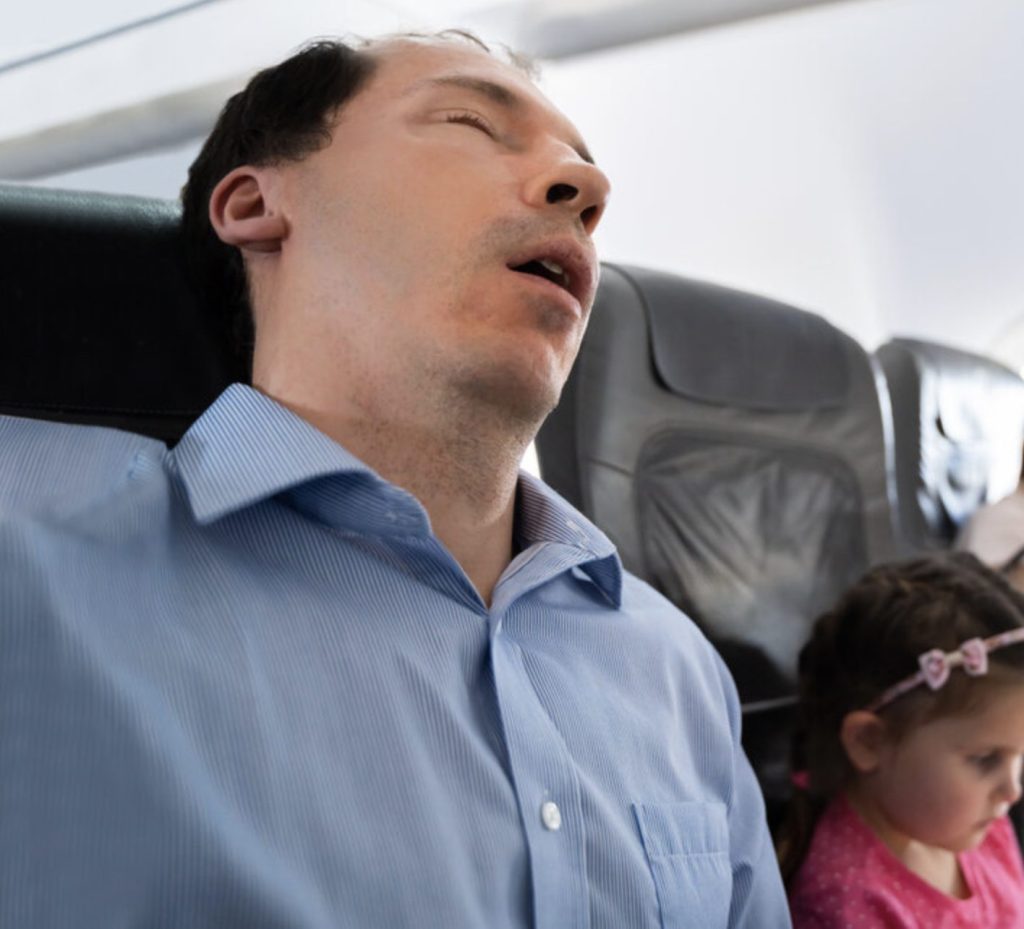Did you know that snoring affects approximately 90 million American adults? It can also ruin your travel experience and affect your well-being. Snoring can make you and your companions lose sleep, feel tired, get cranky, and miss out on the fun of traveling. In this article, we’ll help you understand why you snore, and how to stop snoring when traveling.
What Causes Snoring?
Snoring is the sound of air passing through narrowed or blocked airways in your nose and throat. When you sleep, the muscles in your upper airway relax and collapse, causing vibrations and noise. Snoring can be influenced by many factors, such as:
- Age: As you get older, your throat muscles become weaker and more prone to snoring.
- Weight: Excess weight can put pressure on your airways and cause them to narrow or collapse.
- Alcohol: Alcohol relaxes your throat muscles and reduces your ability to breathe properly.
- Smoking: Smoking irritates your airways and causes inflammation and mucus buildup.
- Allergies: Allergies can cause congestion and swelling in your nose and throat.
- Medications: Some medications can relax your throat muscles or cause dryness in your mouth and throat.
- Anatomy: Some people have anatomical features that make them more likely to snore, such as a deviated septum, enlarged tonsils, or a small lower jaw.
Snoring can also be a sign of a serious condition called sleep apnea, which is when you stop breathing for short periods during sleep. Sleep apnea can increase your risk of high blood pressure, heart disease, stroke, diabetes, and other health problems. If you snore loudly and frequently, and experience symptoms such as daytime sleepiness, headaches, mood swings, or difficulty concentrating, you should consult a doctor for diagnosis and treatment.
How to Prevent Snoring When Traveling?
The good news is that you can prevent or reduce snoring by making some simple changes to your sleep habits and lifestyle. Here are some tips on how to stop snoring when traveling:

- Avoid alcohol and caffeine before bed: Alcohol and caffeine can interfere with your sleep quality and make you more likely to snore. Try to avoid drinking alcohol or caffeinated beverages at least four hours before bedtime.
- Sleep on your side: Sleeping on your back can cause your tongue and soft palate to fall back into your throat and block your airway. Sleeping on your side can help keep your airway open and reduce snoring. You can use a pillow or a rolled-up towel behind your back to prevent you from rolling onto your back.
- Use nasal strips or sprays: Nasal strips or sprays can help open up your nasal passages and improve airflow. They are easy to use and carry when traveling. You can buy them over-the-counter at most pharmacies or online.
- Use anti-snoring devices: There are many products or devices that can help you stop snoring by adjusting the position of your jaw, tongue, or soft palate. Some of the most popular and effective ones are:
- Anti-snoring pillows: These are specially designed pillows that support your head and neck in a way that keeps your airway open. They are usually made of memory foam or latex and come in different shapes and sizes. They are comfortable and portable for traveling.
- Mouthpieces: These are devices that fit inside your mouth and move your lower jaw forward or hold your tongue in place. They help prevent your airway from collapsing or vibrating. They are usually custom-made by a dentist or an online service based on your mouth measurements. They are small and discreet for traveling.
- Chin straps: These are straps that wrap around your chin and head and keep your mouth closed. They help prevent snoring by forcing you to breathe through your nose instead of your mouth. They are made of elastic or neoprene material and come in different colors and styles. They are easy to use and pack for traveling.
- Ear plugs: These are devices that fit inside your ears and block out the noise of snoring. They help you sleep better without being disturbed by snoring sounds. They are made of foam, silicone, wax, or rubber and come in different shapes and sizes. They are cheap and convenient for traveling.
How to Cope with Snoring When Traveling?
Even if you take steps to prevent snoring when traveling, you may still encounter some challenges or difficulties along the way. Here are some ways to cope with snoring when traveling:

- Communicate with your travel partner or host: If you’re traveling with someone who snores or who is bothered by your snoring, it’s important to communicate openly and respectfully about the issue. Let them know that you’re aware of the problem and that you’re willing to find a solution that works for both of you. You can also express appreciation for their patience and understanding.
- Find alternative sleeping arrangements or locations: If possible, try to find a sleeping arrangement or location that minimizes the impact of snoring on others. For example, you could book a separate room, use a white noise machine, sleep in a different time zone, etc. You can also look for hotels or hostels that offer anti-snoring amenities or services, such as soundproof rooms, anti-snore pillows, ear plugs, etc.
- Seek professional help or support: If snoring is affecting your health or well-being, you may want to seek professional help or support from a doctor, a therapist, a sleep specialist, etc. They can diagnose the cause of your snoring, prescribe medication or surgery if needed, provide counseling or therapy if needed, etc. You can also join a support group or an online community where you can share your experiences and tips with other snorers or their partners.
Conclusion
Snoring doesn’t have to ruin your travel experience. By following these simple tips and tricks, you can stop snoring when traveling and enjoy your trip with peace and comfort. Don’t let snoring hold you back from exploring the world and having fun. Try these anti-snoring products or devices today and see the difference for yourself. You’ll thank us later!
Remember this quote by Mark Twain: “Travel is fatal to prejudice, bigotry, and narrow-mindedness…and many of our people need it sorely on these accounts.” So don’t let snoring stop you from traveling!
Sources
Snoring: Causes, Remedies & Prevention (clevelandclinic.org)
Treatments to Prevent Snoring on an Airplane (verywellhealth.com)





